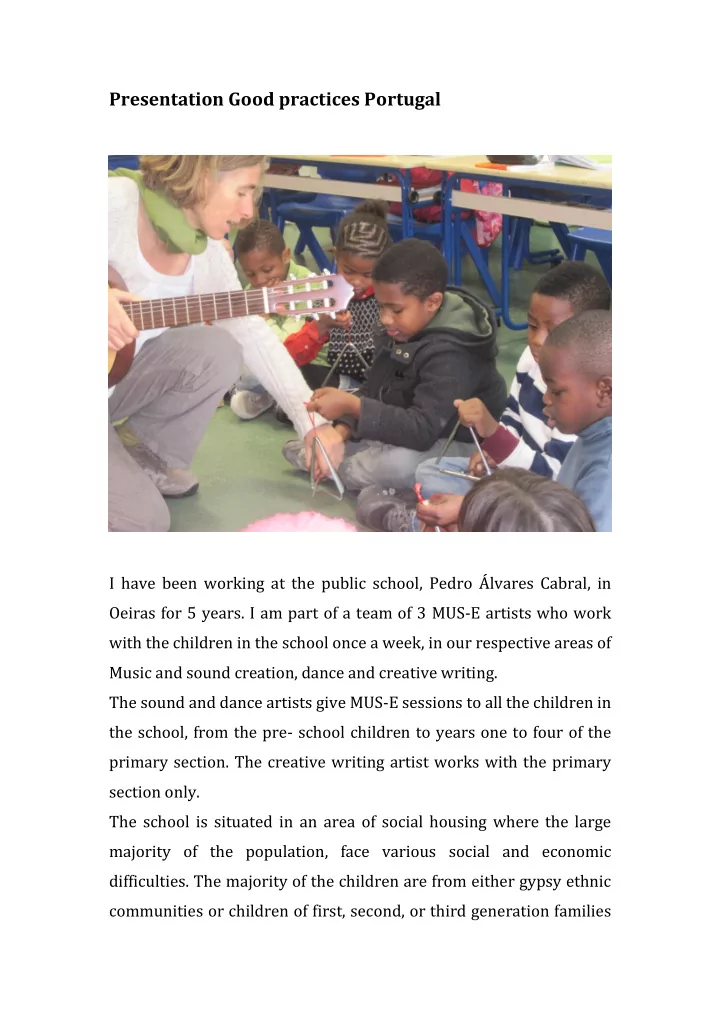

Presentation Good practices Portugal I have been working at the public school, Pedro Álvares Cabral, in Oeiras for 5 years. I am part of a team of 3 MUS-E artists who work with the children in the school once a week, in our respective areas of Music and sound creation, dance and creative writing. The sound and dance artists give MUS-E sessions to all the children in the school, from the pre- school children to years one to four of the primary section. The creative writing artist works with the primary section only. The school is situated in an area of social housing where the large majority of the population, face various social and economic difficulties. The majority of the children are from either gypsy ethnic communities or children of first, second, or third generation families
that have emigrated from ex-Portuguese colonies in África – Cape Verde, Angola, Mozambique, Guinea Bissau and São Tomé and Principe. We work closely with the teachers, developing a program of activities that compliments the classroom learning. The school community works in very challenging situations, where many of the children need specialized learning support or who have serious behavior problems. We work closely with teachers, planning activities that will compliment their regular classes and help them to develop fundamental socio-personal skills such as self- confidence, concentration, self- expression and creativity. We also develop activities that will enhance integration, deal with conflict
management and intercultural understanding between the diverse ethnic backgrounds of the children and their families. In some years we have worked together with the school community on themes that can be applied across the curriculum. One year, for example we explored the theme of our identity and of our community. Drawing on the children ’ s own views of their own sense of identity, of where they live and the people who live there, we developed creative and exploratory activities that enabled the children to reflect on and express their own views and ideas. In my sessions, we explored our diverse musical influences and composed music and songs expressing this diversity. The dance artist also explored different dance languages inspired by the cultural backgrounds of the children. This culminated in a festival at the end
of the year in which we shared with the parents some of the activities we had developed with the children. The children ’ s spirit of unity and joy to dance and make music together, served as a positive example for their parents of inter-cultural understanding and living together harmoniously. Another example of collaborative projects with teachers is when we supported one of the pre-school teachers in a project she had developed around the life of a pond. Together with the children, she built a pond in the playground of the school and the children studied and observed the wildlife and animals that made their home in or around this pond. The MUS-E artists worked together with the teacher exploring these themes through music, sound creation and dance. At the end of the year the class created a theatre show, with
puppets, a song and a dance related to this theme, which they performed to the parents. We also organize every year, open MUS-E sessions, where the parents are invited to participate. The aim of these sessions is to enable the parents and families to see what kind of work we do and, at the same time develop a closer relationship of trust and friendship with them and with the school community. The MUS-E sessions that I develop as a sound and music artist, always include a wide variety of activities such as: singing, rhythm and sound games that develop social and listening skills, movement and sound, instrument making, improvisation, composition and sound exploration. Portugal has a rich repertory of traditional song and dance, which I also include in many of my sessions.
There is a strong focus in our work of enabling the children to develop their own creative ideas and self -confidence and over the years, they have produced many wonderful examples of their own compositions, choreographies, songs, soundscapes, stories and poems. The MUS-E artists have developed over the years, a very close working relationship with the teachers and the whole school community. While there have been recent changes in the teaching staff, we have been able to offer the school community a sense of constancy and continuation in the midst of these other changes. This is extremely beneficial for the children, giving them a sense of continuity and security. This is especially true, for the ones who move from the pre- school to the primary. This is a big transition for them: they change building, start the primary curriculum with new
teachers, the MUS-E artists they know well, continue to work with them. The MUS-E project in Oeiras, therefore has built a solid foundation in this school and the local community, serving as an example of how this kind or work can make a profound and essential contribution to the overall well-being, development and education of the these young children.
Recommend
More recommend